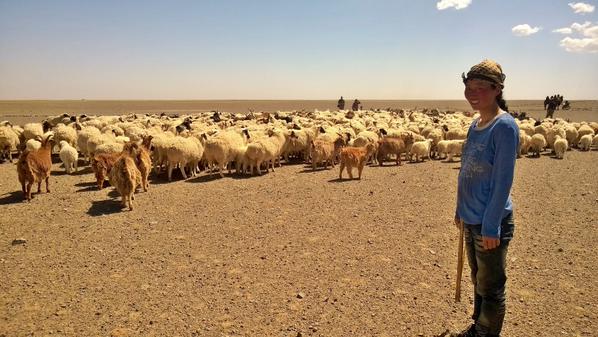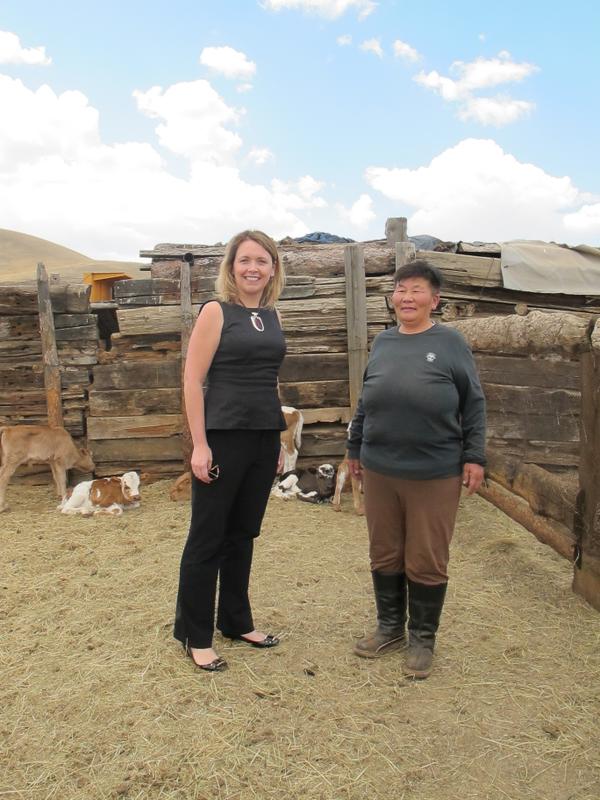
MCC
MCC is working with the Government of Mongolia to develop a second compact, continuing a strong relationship built during MCC's $285 million first compact which ended in 2013. The five-year investment was designed to provide benefits to 2 million Mongolians in key areas such as property rights, vocational education, health, road infrastructure, and energy and environment.
Drinking a cup of soo-tay sai, a milky tea, with a herder family in the Mongolian countryside in late May, I heard the immense pride in Ms. Javzan’s voice. She retrieved her accounting books and showed me meticulous records of her 1,000+ animals and increase in household income, thanks to the training she received from MCC’s Peri-Urban Rangeland Project in its first compact. She was thrilled Mongolia had been selected by MCC’s Board of Directors this past December to receive a second compact.

MCC
MCC CEO Dana J. Hyde with a livestock herder in Mongolia during a trip in late May. MCC is in the process of working with the Government of Mongolia to develop a second compact.
Like so many other livestock herders in Mongolia, Ms. Javzan has had to move from traditional rural lands to peri-urban areas near the cities. Today, almost half of Mongolia’s 3 million people live in the capital city, Ulaanbataar, putting enormous strain on aging infrastructure, limited social services, nascent institutions, and the local economy. Mongolia’s abrupt transition to a market economy, rapid urbanization of a traditionally pastoral society, and investments in mineral resources have been challenging to manage. For a landlocked country roughly the size of Western Europe, environmental challenges like climate change, desertification, and pollution have regional and global implications.
Through our $285 million investment in the first compact, MCC has been at the forefront of addressing poverty reduction through economic growth in Mongolia. The compact was designed to provide benefits to 2 million Mongolians across five key areas: property rights, vocational education, health, road infrastructure, and energy and environment.
During my travels to Mongolia, I saw firsthand the impact of MCC projects and discussed challenges and lessons learned that will be helpful as we develop our second compact. Traveling through the Mongolian steppe and Gobi desert, I met vocational students, livestock herders, civil society leaders, private sector representatives, and government officials who are proud beneficiaries of our investments.
For instance, in Choir, I saw vocational students operate Caterpillar forklifts and fix car engines, critical skills that help build local economies. Visiting a traditional ger district on the outskirts of Ulaanbaatar, I enjoyed another cup of soo-tay sai boiled on an MCC cook stove designed to promote energy efficiency and reduce pollution levels. And standing below 31 General Electric turbines at Mongolia’s first wind farm at Salkhit, I could envision Mongolia’s future as a leader in renewable energy sources like wind and solar.
These successes were made possible because of the strong relationship MCC has with the Mongolian people. Now is the time to build on this foundation as we develop a second compact. The Government of Mongolia has already set up a core team that is leading the compact development process, including undertaking a rigorous constraints analysis that will analyze constraints to economic growth.
In the coming months and years, MCC will continue to work with Mongolia to create an enabling environment for economic growth. Together, we can advance a shared agenda of economic freedom, investment in people, and good governance. And what better way to commemorate Mongolia’s 25th anniversary of its transition to democracy than to work together in a shared agenda of inclusive growth and to provide a future of opportunity for the people on Mongolia.

